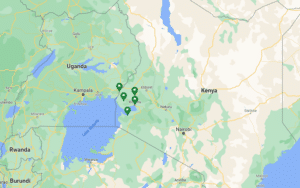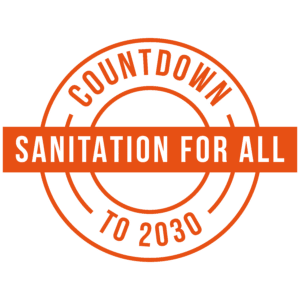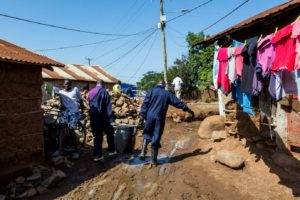Falling behind on Agenda 2030
The world is seriously off track in meeting its goals of sanitation for all. With only eight years left, the world needs to work four times faster to meet our promise.
This year, on World Toilet Day we are shining the spotlight on fast-growing towns in the Western part of Kenya. These are the types of places which get little attention, where capacities and resources are often very poor, and where needs are likely to escalate in the run-up to 2030.
Across sub-Saharan Africa, the urban population has grown by 22% in five years (2015-2020), and in Kenya the urban population grew by 24% over the same period. And progress on providing people with basic sanitation has not been able to keep up. The number of urban residents without even basic sanitation has increased by 34.4m (16%) between 2015 and 2020.
We have been working in the City of Kisumu, home to 500,000 people and the economic hub for the west of Kenya. But 60% of the population live in low-income settlements. Sanitation provision remains poor in much of this area, with our surveys finding that while open defecation is rare, 30% use toilets that would count as ‘unimproved’ (pit latrines without a slab or platform), and rates of sharing are very high – more than half of households share a toilet with 5 or more other households. Nearly a quarter said their toilet currently needed emptying[1].

Practical Action’s lasting solutions for sanitation in Kisumu, Kenya
In our work we have made some in-roads into this situation, with 22,000 people now living in areas where toilet provision is far better, and the environment is free from open pollution from faeces with good use of pit emptying services[2]. Our urban Community-Led Total Sanitation approach has been successful in increasing demand for toilets and working with pit emptiers to develop viable business models for serving low-income communities. With improved working conditions and services for users, our people-centred approach has developed lasting sanitation solutions.
“7 neighbourhood units have been declared as ‘hygienically safe urban neighbourhoods’, with enough good quality toilets, free from open defecation and open disposal of faeces. These were some of the first urban low-income neighbourhoods to achieve this status in Kenya.”[2]
Rapid urbanisation – an urgent need for action in the Lake Victoria Basin
However, there remains much to do. There are still large areas within Kisumu where progress remains slow. We also recently reviewed the situation in 4 other towns in the Lake Victoria Basin: Siaya, Kakamega, Busia and Homa Bay. There we found a similar story. In Siaya, 11% were using toilets that opened directly into drainage channels. In Busia, 60% of households were sharing with at least 5 other households. In Kakamega, 26% said their toilet was currently full and needing emptying.[1]
Achieving climate resilient towns and cities which are fit for the future
This World Toilet Day’s theme highlights the impact of poor sanitation on ground water. When these areas flood, which happens regularly and severely in towns like Kisumu, Siaya and Homa Bay, the contents of drains and pit latrines spreads out with its load of disease and infection across neighbourhoods and into homes.[1]
Practical Action brings a deep understanding of the sanitation value chain across these towns, and how this intersects with climate risk. Our experience of working in urban areas across Kenya for over 25 years means that we are well positioned to catalyse change for better working conditions and quality sanitation services.
We are aiming to expand our climate-resilient sanitation programming so that we can ensure urbanisation includes safe sanitation which is fit for the future.
We must act now – the Countdown to 2030 is on.

[1] WASH Situation Analysis: Lake Victoria Basin (Practical Action, 2021).
[2] Impact Brief: Kisumu city partnerships for improved sanitation in informal settlements (Practical Action, 2021).
